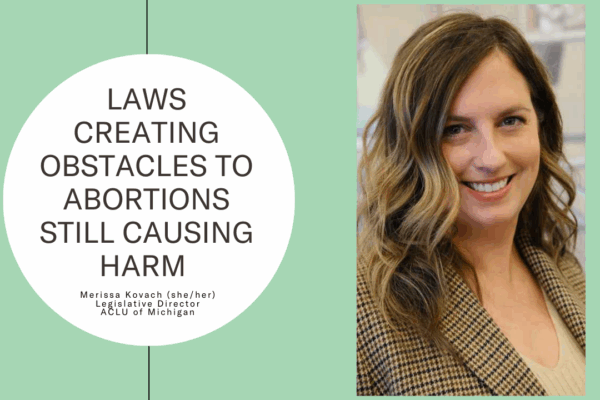The Legislature Needs to Repeal Them
Following the U.S. Supreme Court’s 1973 Roe v. Wade decision establishing a right to abortion 50 years ago, anti-abortion forces around the country began passing laws creating obstacles to a medical procedure people were legally entitled to.
Michigan was no exception.
Starting in 1976, laws intended to make obtaining an abortion as difficult as possible began piling up – despite increasing public support for abortion.
Last year, in the wake to the Supreme Court’s Dobbs decision overturning Roe, Michiganders went to the polls to make clear their support for abortion by amending the state Constitution to ensure the right to obtain one would be protected here for generations to come.
But dangerous anti-abortion laws, built up over decades, remain in place. The purpose of these laws has nothing to do with enhancing patient health and safety, and everything to do with creating needless obstacles to the procedure.
Hardest hit have been historically disenfranchised communities, including Black, Brown, and Indigenous people, rural residents, LGBTQ+ people, people with disabilities, young people, and people trying to make ends meet.
The reactionary effort kicked off in 1976, when the Legislature banned public school employees from teaching abortion as a method of family planning or reproductive health.
Some of the laws, such as government mandated counseling and a 24-hour waiting period for people seeking an abortion are intended to delay and dissuade people from getting the care they need. But as pro-abortion activist Clare Molnar explains in a video released by the ACLU of Michigan, these laws also contribute to what she describes as the terribly harmful culture of secrecy and shame surrounding abortion.
What Ms. Molnar articulates is the implicit message many of these laws send, and the psychological impact they have on people seeking an abortion.
“You start to think that, if they are making you jump through so many hoops to have an abortion, there must be something wrong with abortion,” says Ms. Molnar. Such laws can deter people from having an abortion. Others are left hiding from friends and family the fact that they’ve had the procedure, leaving them feeling isolated and alone.
A more overt tactic was adopted in 2012, when anti-abortion legislators passed laws requiring providers to meet medically unnecessary and financially burdensome regulations. Known as Targeted Regulation of Abortion Providers (TRAP) laws, the regulations either forced providers out of business or caused operating costs to soar, making abortions more expensive for patients. The combined effect was a decrease in access to abortions, especially for people in rural areas and trying to make ends meet. “Over the years,” according to the Ford Foundation, “as legislators enacted an array of restrictions that burdened the time, place and circumstances for abortions to be performed, clinical services became harder to find and more expensive to obtain.”
One year after TRAP laws went into effect, the Legislature prohibited private health insurance companies from covering abortions unless individuals purchase a supplemental policy in advance of becoming pregnant.
A requirement that minors seeking an abortion obtain the permission of either a parent or a judge is seen as downright dangerous by the medical community. The American Medical Association (AMA), the Society for Adolescent Health and Medicine (SAHM), the American Public Health Association (APHA), and the American Academy of Pediatrics (AAP) are among the groups pointing out the harms parental consent laws such as Michigan’s can cause.
“There is no law that can mandate healthy family communication,” explains the AAP. “Laws requiring parental notice or consent actually may endanger the teens they intend to protect by increasing the possibility of: delayed access to medical care, illegal and self-induced abortion, family violence, homelessness, suicide…”
The time has long passed for the Michigan Legislature to get these and other anti-abortion laws off the books. What has changed is that, in the last election, voters elected a majority of legislators in both chambers and a governor who are supportive of reproductive rights.
We currently have an incredible opportunity to move Michigan forward in a significant way, and must take advantage of it.
Merissa Kovach (pronouns: she, her, hers) is the Legislative Director for the ACLU of Michigan.


